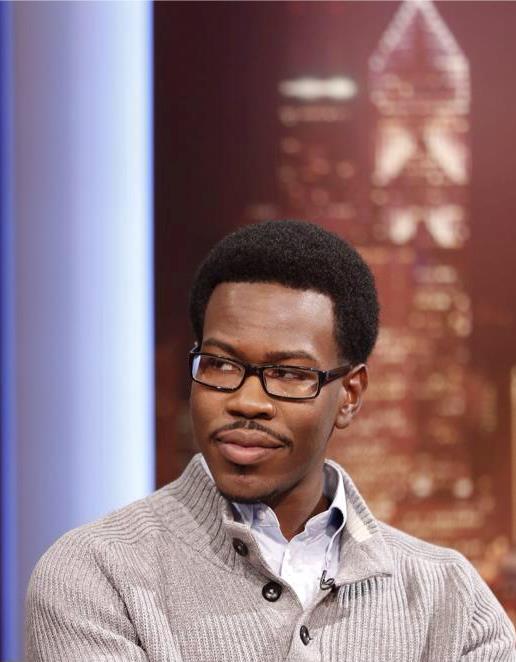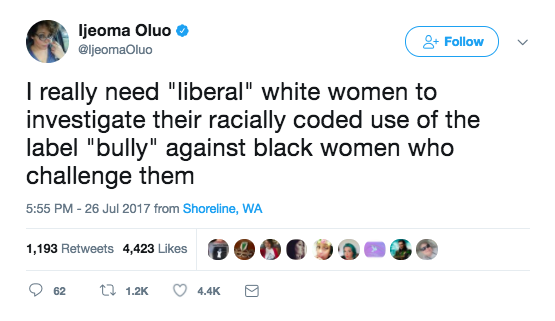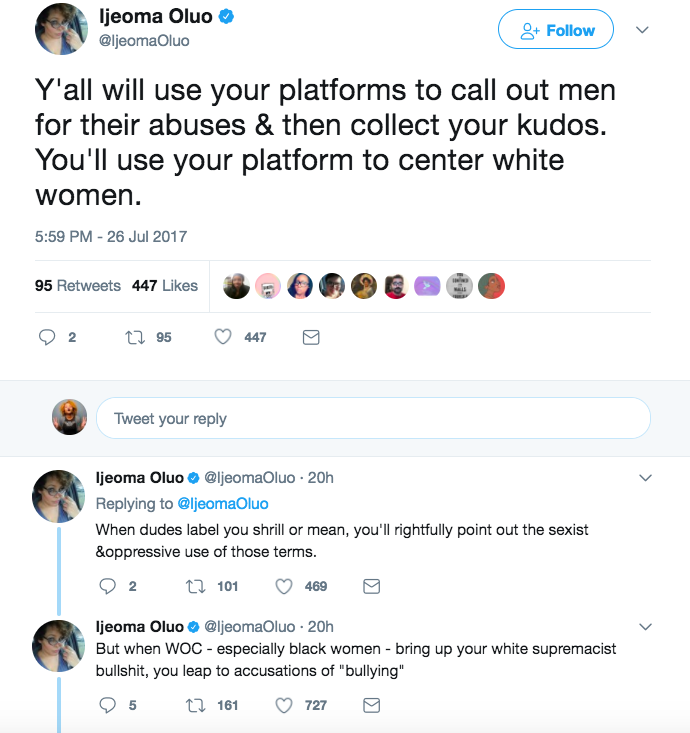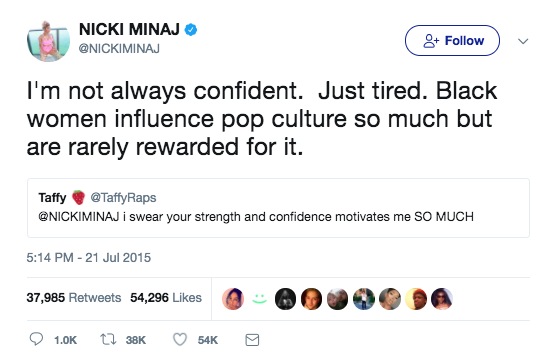Woman's Viral Tweets Calls Out White Liberal Women's Use of This Racially Coded Word

By:
A lot of the conversation on black Twitter tends to touch on the unease black women on the left feel toward their white liberal counterparts, and on Wednesday one woman probed the topic in a tweet that quickly went viral.
Ijeoma Oluo's post addressed white liberal women, decrying their alleged use of the word "bully" to describe black women.
 Ijeoma Oluo/ Twitter - twitter.com
Ijeoma Oluo/ Twitter - twitter.com
The editor-at-large at The Establishment also noted the hypocrisy in their feminist fight when they call out men for using sexist words to condemn women but often call women of color bullies when they speak out on issues.
 Ijeoma Oluo/Twitter - twitter.com
Ijeoma Oluo/Twitter - twitter.com
Some people who replied to Oluo were in support and others disagreed with her (see the entire Twitter thread here).
But whatever the response to Oluo, she spurred an important conversation that anybody who claims to be a proponent of racial justice or feminism should consider.
For one, when it comes to racial tension in the feminist movement, it makes sense why black women would be triggered by being condemned as bullies or too aggressive when they speak out on issues.
Black women are paid less than white woman (the gender gap is bigger for African-American woman and Latinas than white women, according to a recent report by the American Association of University Women). Black women are also underrepresented in Hollywood and in mass media. Moreover, black women haven't been silent on feeling left out of the mainstream feminist movement, a dissonance that led many to sit out on the Woman's March in D.C., a mass demonstration that won widespread praise but still left a bad taste in the mouths of a lot of women of color.
When the demands and grievances of black women are undermined by coded language and stereotypes used by supposed allies to dismiss their grievances, such subversive responses only bolster the skepticism so many black feminists have of their white counterparts.
Maybe that's why Oluo's tweets resonated with so many people.
On Thursday morning, ATTN: reached out to Oluo to ask the journalist what inspired her tweet, and if she had any personal experience with the issue it tackled. She hasn't gotten back to us yet but we will update the piece when we hear back.
However, there are no shortage of instances of white liberal women playing victim to their black counterparts. Miley Cyrus tried to call out Nicki Minaj for a July 2015 tweet where she complained about "Anaconda" being left out of the MTV VMA award nominations for Video of the Year.
"Black women influence pop culture so much but are rarely rewarded for it," the New York pop star tweeted.
 Nicki Minaj/Twitter - twitter.com
Nicki Minaj/Twitter - twitter.com
"If you do things with an open heart and you come at things with love, you would be heard and I would respect your statement... But I don't respect your statement because of the anger that came with it," she said in response in an interview with the New York Times.
An article on Bet.com tried to interpret what Cyrus was trying to say: "Minaj should have adopted a softer, more conciliatory tone when talking about the decades of discrimination Black women in media have faced." The headline of that article was aptly, "Miley Cyrus Basically Calls Nicki Minaj an Angry Black Woman."
In later tweets on Wednesday, Oluo also connected the coded language she had decried to the stereotype of the angry black woman she feels some white women use to their advantage.
Studies, like this one, have examined how "Black women have become the victims of negative stereotyping in mainstream American culture." The consequences of the angry black woman trope are far-sweeping, besetting black women across a spectrum of social classes. In an interview with Oprah last year, Michelle Obama said, "[t]he angry black woman label hurt me," referring to how she was characterized during her husband's campaign for president. This confession from the former first lady goes to show that class, wealth or status doesn't grant black women immunity to the stereotype.
She was talking about one kind of pain, but sometimes the consequences of how society views black women can be fatal.
On July 10, 2015, Texas Trooper Brian Encinia pulled Sandra Bland over for a minor traffic violation, but the exchange escalated and turned violent, with Encinia pulling her out of her car and allegedly slamming her to the ground. Texas authorities claimed Bland "became argumentative and uncooperative." According to authorities, Bland's violent run-in ended with her hanging herself in a jail cell three days later. In 2015, Zerlina Maxwell wrote for Cosmopolitan that Encinia treated Bland like "someone who needed to be controlled by any means necessary, a result of the implicit bias that permeates our society," and cites a book by a prominent black woman journalist who worked for MSNBC during the time to help make her point:
"Sandra Bland is dead in part because black women are stereotyped as aggressive or angry, and this poisons every single interaction they have. In her book Sister Citizen, MSNBC host Melissa Harris-Perry likens the experience of black women in America to trying to stand up straight in a "crooked room," all while we are constantly dehumanized and undervalued as full citizens. She writes, "Bombarded with warped images of their humanity, some women tilt and bend themselves to fit the distortion." Specifically, she notes that too often, black women are instantly mischaracterized as "shrill, loud, argumentative, irrationally angry, and verbally abusive."
In a prize-winning essay, titled "The Killing of an 'Angry Black Woman': Sandra Bland and the Politics of Respectability," Victoria D. Gillon of Augustana wrote, "Sandra Bland’s resistance disrupted the power structure towards black American women. Bland did not adhere to the politics of respectability that was expected of her."
Oluo's tweet might seem like just that - only a tweet - but it's clear she tapped into something a lot deeper.
